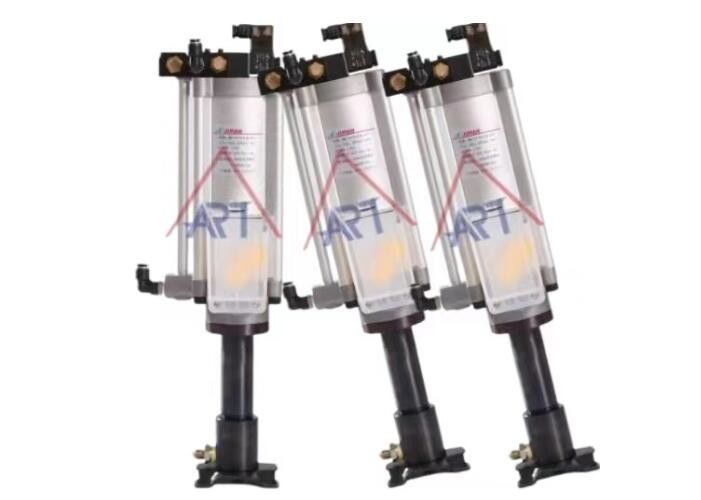Product Feature:
Air oil unclamping booster pneumatic cylinder with a diameter of 12 mm and a ø125 pressure boosting ratio of either 11:1 or 30:1.
The purpose of this type of cylinder is to provide a more powerful and precise clamping force for industrial applications. The booster works by using compressed air to pump oil at a higher pressure than what the input air pressure would normally allow, thus amplifying the force output of the cylinder.
The diameter of 12 mm refers to the size of the cylinder's bore, which determines the maximum force output that the cylinder can generate. The pressure boosting ratio of ø125 could mean that the cylinder's output pressure is either 11 times or 30 times greater than the input air pressure, depending on the specific model.
Overall, this type of pneumatic cylinder is designed for applications that require high clamping force and precision, such as in the manufacturing of automotive parts or in the assembly of aerospace components. The air oil unclamping booster technology allows for a more efficient and powerful clamping force, which can improve production efficiency and quality control.
Order Form
BMV--10--U--16--M--70--MA
1) 2) 3) 4) 5) 6)
| BMV:Supercharged knife punch pneumatic cylinder |
| 1) |
Diameter |
10:Ø100 12:Ø125 |
| 2) |
Applicable model |
U:used to MC |
| 3) |
Oil pressure ratio |
11=11:1 12=12:1 16=16:1 25=25:1 30=30:1 39=39:1 51=51:1 |
| 4) |
|
M:With hydraulic detection device
N:No hydraulic detection device
|
| 5) |
Spit volume |
50cc, 70cc, 110cc, 150cc,etc |
| 6) |
Mounting type |
FA:vertical type,LB:horizontal type |
Product Description
1.Working pressure: The pump can operate within a pressure range of 0.4 megapascals (MPa) to 0.6 MPa. This can also be expressed as 4 kilograms-force per square centimeter (kgf/cm²) to 6 kgf/cm². The compressed air used to filter the pump should also be within this pressure range.
2.Transmission oil: The pump is designed to work with a specific viscosity grade of oil, which is ISO VG32 or an equivalent viscosity grade.
Working temperature: The pump can operate within a temperature range of 0 degrees Celsius to 60 degrees Celsius.
Split out quantity: The pump can output four different quantities of oil, which are 150cc, 110cc, 70cc, and 50cc.
Voltage: The pump can operate with three different voltage levels, which are DC24, AC110, and AC220.
Suitable for direct drive spindle, motor built-in spindle, etc., special for high-speed cutting:
The hydraulic motor or spindle is designed to be used in direct drive applications, such as motor built-in spindles.
The motor or spindle is specifically designed for high-speed cutting, indicating that it is capable of operating at high speeds while maintaining its performance and reliability.
Hydraulic cylinders can leak for several reasons, including:
Worn seals: Seals can degrade over time due to friction, pressure, and exposure to hydraulic fluid. Once seals wear out, they may fail to properly contain the hydraulic fluid, leading to leaks.
Scratches or damage to the cylinder rod: If the rod inside the cylinder is scratched or damaged, it can compromise the integrity of the seals, allowing hydraulic fluid to leak past them.
Contaminants: Dirt, debris, or other contaminants in the hydraulic fluid can cause damage to seals or other components of the hydraulic system, leading to leaks.
Over pressurization: Excessive pressure within the hydraulic system can cause seals to fail or hydraulic lines to rupture, resulting in leaks.
Improper installation: Incorrect installation of seals or other components can result in leaks. It's important to follow manufacturer guidelines and use appropriate tools and techniques during installation.
Corrosion: Corrosion can occur within the hydraulic system, leading to damage to seals or other components and ultimately resulting in leaks.
Temperature extremes: Extreme temperatures can affect the viscosity of the hydraulic fluid and the flexibility of seals, potentially leading to leaks.
Age and wear: Over time, the various components of a hydraulic cylinder can wear out, leading to leaks. Regular maintenance and inspection can help identify and address issues before they result in leaks.
To prevent hydraulic cylinder leaks, it's important to regularly inspect the system for signs of wear or damage, replace worn seals and components, use high-quality hydraulic fluid, and maintain proper operating conditions.
Applications:
Air oil unclamping booster pneumatic cylinders can be used in a variety of industries that require high clamping force and precision.
Here are a few examples:
1.Automotive manufacturing: In the production of automotive parts, air oil unclamping booster cylinders can be used to clamp and hold components in place during machining or assembly processes. This ensures that the parts remain securely in place and are properly aligned, resulting in higher quality and more reliable products.
2.Aerospace manufacturing: In the assembly of aerospace components, air oil unclamping booster cylinders can be used to hold large and heavy parts in place while they are being machined or assembled. The high clamping force and precision of these cylinders ensure that the parts remain securely in place and are not damaged during the manufacturing process.
3.Medical device manufacturing: In the production of medical devices, air oil unclamping booster cylinders can be used to hold small and delicate components in place during machining or assembly processes. The high precision of these cylinders ensures that the parts are not damaged or deformed during the manufacturing process, resulting in higher quality and more reliable products.
4.Machine tool manufacturing: In the production of machine tools, air oil unclamping booster cylinders can be used to provide high clamping force and precision for holding workpieces in place during machining processes. This can improve the accuracy and efficiency of the machining process, resulting in higher quality and more precise products.
Overall, air oil unclamping booster pneumatic cylinders can be used in any industry that requires high clamping force and precision, and where the cost of downtime or product failure is high.
Can hydraulic cylinder be rebuilt?
Hydraulic cylinders can be rebuilt. Rebuilding a hydraulic cylinder involves disassembling the cylinder, inspecting its components for wear or damage, replacing any damaged parts such as seals, O-rings, rods, or pistons, and then reassembling the cylinder with the new parts.
Here's a general overview of the steps involved in rebuilding a hydraulic cylinder:
-
Disassembly: The cylinder is removed from its housing and disassembled carefully, taking note of the arrangement of parts and any specific configurations.
-
Inspection: Each component of the cylinder is inspected for signs of wear, damage, or corrosion. This includes the piston, rod, seals, O-rings, gland, and housing.
-
Replacement of Parts: Any worn or damaged parts are replaced with new ones. This typically includes seals, O-rings, and possibly other components depending on the extent of wear.
-
Cleaning: All components, including the housing, are thoroughly cleaned to remove any dirt, debris, or old lubricants.
-
Reassembly: The cylinder is reassembled, ensuring that all parts are properly aligned and seated. Care must be taken to avoid damaging any seals during reassembly.
-
Testing: Once reassembled, the cylinder is tested for proper operation. This may involve pressurizing the cylinder to check for leaks, ensuring smooth movement of the piston and rod, and verifying that all functions operate as expected.
-
Installation: Once the cylinder passes testing, it can be reinstalled in its original application.
Rebuilding a hydraulic cylinder can extend its service life and is often a cost-effective alternative to purchasing a new cylinder, especially for larger or custom cylinders where replacements may be more expensive or difficult to find. However, it requires knowledge of hydraulic systems and proper maintenance techniques to ensure the rebuilt cylinder performs reliably.
FAQ
Q1: We have our own factory and can provide the best price and service.
Q2: We accept customization or non-standard products.
Q3: The MOQ depends on the customer's needs, and trial orders are welcome before mass production.
Q4: The delivery time is 7 days if the company has stock, and 15-30 working days if we don't have stock. However, the delivery time also depends on the quantity and requirements of the products.
Q5: The company's payment terms are T/T.
Q6: The company does not provide samples.

 Your message must be between 20-3,000 characters!
Your message must be between 20-3,000 characters! Please check your E-mail!
Please check your E-mail!  Your message must be between 20-3,000 characters!
Your message must be between 20-3,000 characters! Please check your E-mail!
Please check your E-mail!

